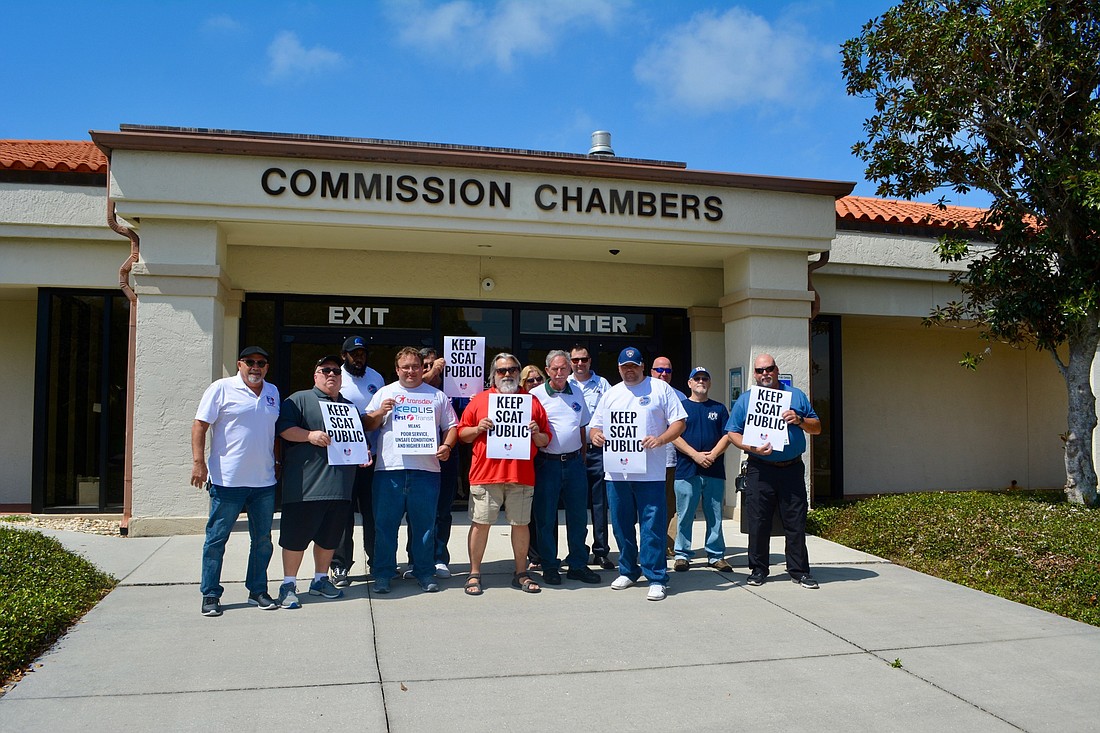- April 27, 2024
-
-
Loading

Loading

As the Sarasota County Board of Commissioners reconvened for the afternoon portion of its March 12 commission meeting, members of the Amalgamated Transit Union from across the country showed up to protest outside of the Venice Commission Chambers.
“Keep transit public!” they chanted, holding signs that read, “Keep SCAT public” and “We’re all one ATU.”
Following months of research and evaluation, the Sarasota County Commission voted unanimously to slow down on the potential privatization of the Sarasota County Area Transit.
Specifically, they agreed to cancel the request for proposal process and instead move towards a workshop to explore their options in greater detail.
Local bus drivers and union members from across the country attended the March 12 meeting to protest privatizing SCAT.
Commissioners first began to explore the potential outsourcing process of its transit system in 2017. By going private, officials aimed to save tax dollars in their $29.8 million operating budget. Last month, SCAT narrowed the list to three potential contractors: TransDev, Keolis and First Transit, companies that operate transit systems in cities and regions across the country.
But not everybody seemed pleased with the possibility of handing over the reins to SCAT’s operations. Rather, the potential plans sparked concern and confusion in the community, particularly where employees, their wages and their benefits were concerned.
But at the March 12 meeting, Rob Lewis, the interim director of SCAT, updated the board on the evaluation process of the companies — especially TransDev, which was ranked top by the Evaluation Committee.
Upon presenting various options for action to commissioners — among them to continue with the request for proposal or to simply leave SCAT as is — commissioners ultimately debated on whether or not the RFP with TransDev would be worth the money and effort.
“Public transit is not something any community makes money with,” Commissioner Nancy Detert said. “It’s like when you put down a road; you don’t make money, you put it down to move people … How do they (private companies) expect to make a profit doing this?”
Additionally, commissioners did not seem convinced that the county would be saving enough money to justify making the jump to a private company.
“By year five, we begin to see only negligible savings," Commissioner Al Maio said of the potential budget. "Actually, by year five, it exceeds the cost of outsourcing … We run the risk of taking a hit in the next five-year contract.”
And as the floor was opened to public comment, SCAT drivers and members of the ATU argued that the only way a private company could profit off the system would be to raise fares, cut employee wages or eliminate aspects of service.
Plus, they argued, a private company would likely not preserve their union contracts.
“The members of the commission may think the ATU may have jumped the gun here in stepping up, but you can hear there is genuine fear for their jobs, their livelihoods, their family,” said ATU International member John Lyons, who came from New York. “Many of the drivers and attendees who are here today are victims of privatization in their own counties.”
But representatives from TransDev who attended said otherwise.
“Every location that I’ve managed, we’ve seen increased efficiency and increased employee morale,” said Hector Fuentes, the potential general manager for Sarasota should TransDev have moved in. “I’ve established excellent relationships with the unions that we work with … We’ve improved safety numbers and in the first six months [in Anaheim] we noticed a 10% reduction in accidents.”
Similarly, other local attendees, such as Matt Brockway and Heather Kasten from the Sarasota Chamber of Commerce, said they believed the county should continue evaluating private companies.
According to Interim SCAT Director Rob Lewis, the county had several options to choose from when it came to deciding the future of SCAT.
While many concerns were legitimate, they said, privatization could still be beneficial for the greater area.
Ultimately, commissioners decided it was best to take the middle ground, particularly as the numbers did not appear complete when presented to the board.
“It’s important that they (private companies) feel like Sarasota County deals in good faith,” Commission Chair Charles Hines said. “Because the numbers that were given to us today, the overall picture of everything, that’s not a whole lot of savings to disrupt a system that we can control.”